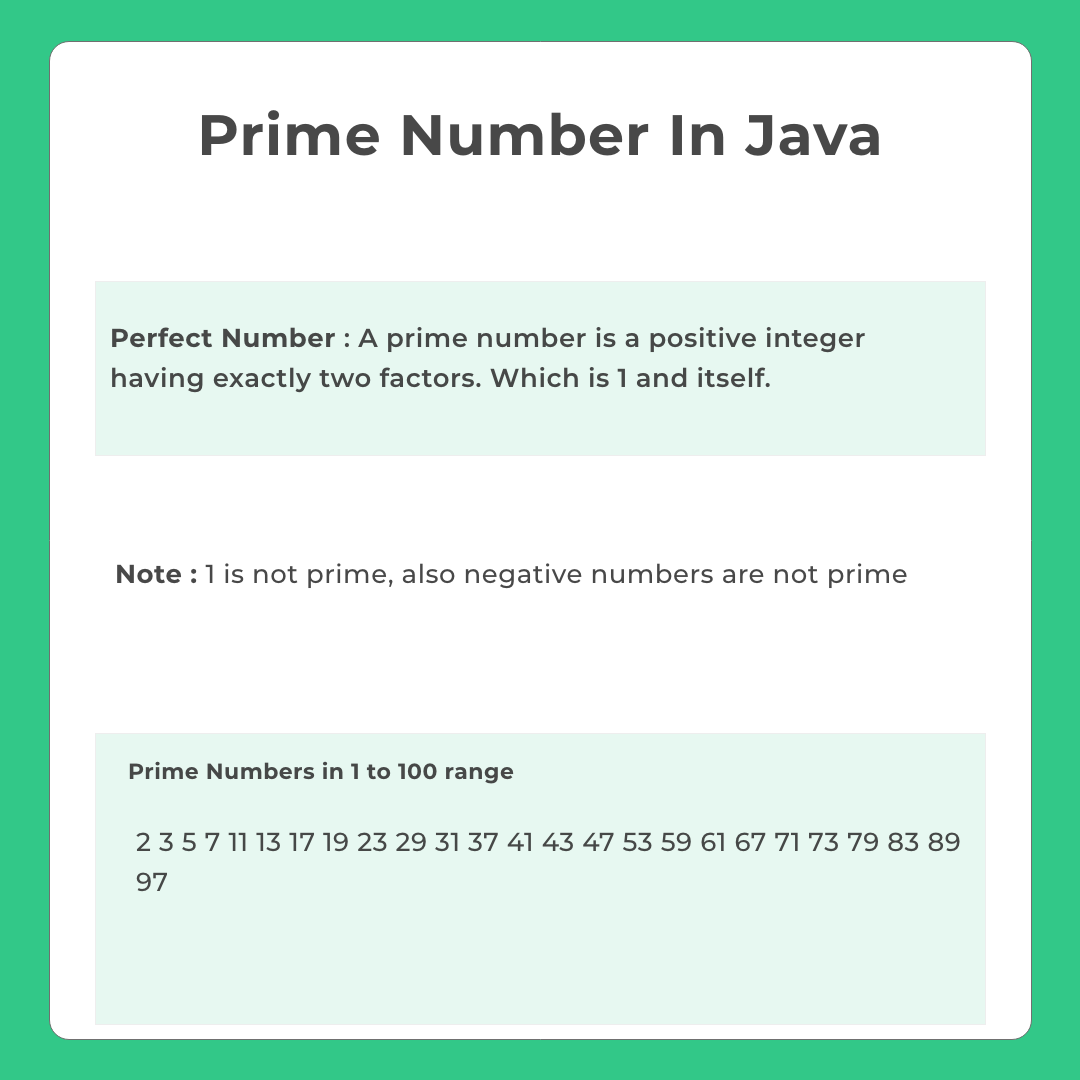Java Program to Find Prime Number between 1 to 100
Finding Prime number between 1 to 100
Here, in this section we will discuss a program to find prime number between 1 to 100 in java. A prime number is a positive integer having exactly two factors. If 11 is a prime, then it’s only factors are necessarily 1 and 11 itself

Methods Discussed on page
- Method 1: Basic checking prime by only checking first n
- Method 2: Basic checking prime by only checking first n/2 divisors
- Method 3: Checking prime by only checking first √n divisors
- Method 4: Checking prime by only checking first √n divisors, but also skipping even iterations.

Method 1
Basic checking prime by only checking first n
Java Code
public class Main
{
public static void main(String[] args) {
int a=1,b=100;
for(int i=a;i<=b;i++){
if(checkPrime(i)){
System.out.print(i+" " );
}
}
}
public static boolean checkPrime(int num){
// 0, 1 and negative numbers are not prime
if(num<2){
return false;
}
else{
// no need to run loop till num-1 as for any number x the numbers in
// the range(num/2 + 1, num) won't be divisible anyways.
// Example 36 wont be divisible by anything b/w 19-35
int x= num/2;
for(int i=2;i<x;i++){
if(num%i==0){
return false;
}
}
}
// the number would be prime if we reach here
return true;
}
}
Output
2 3 5 7 11 13 17 19 23 29 31 37 41 43 47 53 59 61 67 71 73 79 83 89 97
Algorithm (Method 2)
Basic checking prime by only checking first n/2 divisors
- Run a loop in the iteration of (i) b/w 1 and 100 bounds.
- For each, i check if its prime or not using function checkPrime(i)
- If i is prime print it else move to the next iteration
As the range(num/2 + 1, num) won't be divisible anyways. Example 36 won't be divisible by anything b/w 19-35
Java Code
public class Main
{
public static void main(String[] args) {
for(int i=1;i<=100;i++){
if(checkPrime(i)){
System.out.print(i+" " );
}
}
}
public static boolean checkPrime(int num){
// 0, 1 and negative numbers are not prime
if(num<2){
return false;
}
else{
// no need to run loop till num-1 as for any number x the numbers in
// the range(num/2 + 1, num) won't be divisible anyways.
// Example 36 wont be divisible by anything b/w 19-35
int x= num/2;
for(int i=2;i<x;i++){
if(num%i==0){
return false;
}
}
}
// the number would be prime if we reach here
return true;
}
}
Output
2 3 5 7 11 13 17 19 23 29 31 37 41 43 47 53 59 61 67 71 73 79 83 89 97
Method 3
Checking prime by only checking first √n divisors
The outer logic remains the same. Only the method to check prime changes to make code more optimized. Has better time complexity of O(√N)
- Run a loop in the iteration of (i) b/w 1 and 100 bounds.
- For each, i check if its prime or not using function checkPrime(i)
- If i is prime print it else move to next iteration
n = a * b
Now a and b can't be both greater than the square root of n, since then the product a * b would be greater than sqrt(n) * sqrt(n) = n.
So in any factorization of n, at least one of the factors must be smaller than the square root of n, and if we can't find any factors less than or equal to the square root, n must be a prime.
So we only need to run loop till sqrt(n) and not n or n/2
Java Code
import java.lang.Math;
public class Main
{
public static void main(String[] args)
{
for(int i=1;i<=100;i++)
{
if(checkPrime(i))
{
System.out.print(i+" " );
}
}
}
public static boolean checkPrime(int num)
{
// 0, 1 and negative numbers are not prime
if(num<2)
{
return false;
}
else
{
// A number n is not a prime, if it can be factored into two factors a & b:
// n = a * b
/*Now a and b can't be both greater than the square root of n, since
then the product a * b would be greater than sqrt(n) * sqrt(n) = n.
So in any factorization of n, at least one of the factors must be
smaller than the square root of n, and if we can't find any factors
less than or equal to the square root, n must be a prime.*/
for(int i=2;i<Math.sqrt(num);i++)
{
if(num%i==0)
{
return false;
}
}
}
// the number would be prime if we reach here
return true;
}
}
// This method is obviously faster as has better time complexity
Output
2 3 5 7 11 13 17 19 23 29 31 37 41 43 47 53 59 61 67 71 73 79 83 89 97
Method 4
Checking prime by only checking first √n divisors, but also skipping even iterations.
The outer logic remains the same. Only the method to check prime changes to make code more optimized. Has same time complexity of O(√N).
But makes around half lesser checks
- Run a loop in the iteration of (i) b/w 1 to 100 bounds.
- For each, i check if its prime or not using function checkPrime(i)
- If i is prime print it else move to next iteration
We can simply check all divisors between [2, √num]
2 is the only even prime number
We can skip all even iterations in the loop
Java Code
import java.lang.Math;
public class Main
{
public static void main(String[] args) {
for(int i=1;i<=100;i++){
if(checkPrime(i)){
System.out.print(i+" " );
}
}
}
public static boolean checkPrime(int n){
// 0 and 1 are not prime numbers
// negative numbers are not prime
if(n<=1){
return false;
// special case as 2 is the only even number that is prime
}else if(n==2){
return true;
// Check if n is a multiple of 2 thus all these won't be prime
}else if(n%2==0){
return false;
}
// If not, then just check the odds
for(int i=3;i<Math.sqrt(n);i+=2){
if(n%i==0){
return false;
}
}
return true;
}
}
// This method is obviously faster as makes around half lesser comparision due skipping even iterations in the loop
Output
2 3 5 7 11 13 17 19 23 29 31 37 41 43 47 53 59 61 67 71 73 79 83 89 97
Prime Course Trailer
Related Banners
Get PrepInsta Prime & get Access to all 200+ courses offered by PrepInsta in One Subscription
Working with Numbers
- Highest Common Factor(HCF): C | C++ | Java | Python
- Lowest Common Multiple (LCM) : C | C++ | Java | Python
- Greatest Common Divisor : C | C++ | Java | Python
- Binary to Decimal to conversion : C | C++ | Java | Python
- Octal to Decimal conversion : C | C++ | Java | Python
- Hexadecimal to Decimal conversion: C | C++ | Java | Python
- Decimal to Binary conversion: C | C++ | Java | Python
- Decimal to Octal Conversion: C | C++ | Java | Python
- Decimal to Hexadecimal Conversion: C | C++ | Java | Python
- Binary to Octal conversion : C | C++ | Java | Python
- Octal to Binary conversion : C | C++ | Java | Python
- Quadrants in which a given coordinate lies : C | C++ | Java | Python
- Permutations in which n people can occupy r seats in a classroom : C | C++ | Java | Python
- Maximum number of handshakes: C | C++ | Java | Python
- Addition of two fractions: C | C++ | Java | Python
- Replace all 0’s with 1 in a given integer : C | C++ | Java | Python
- Can a number be expressed as a sum of two prime numbers : C | C++ | Java | Python
- Count possible decoding of a given digit sequence : C | C++ | Java | Python
- Check whether a character is a vowel or consonant : C | C++ | Java | Python
- Check whether a character is a alphabet or not : C | C++ | Java | Python
- Calculate the area of a circle : C | C++ | Java | Python
- Find the ASCII value of a character : C | C++ | Java | Python
- Find the prime numbers between 1 to 100 : C | C++ | Java | Python
- Calculate the number of digits in an integer : C | C++ | Java | Python
- Convert digit/number to words : C | C++ | Java | Python
- Counting number of days in a given month of a year: C | C++ | Java | Python
- Finding Number of times x digit occurs in a given input : C | C++ | Java | Python
- Finding number of integers which has exactly x divisors: C | C++ | Java | Python
- Finding Roots of a quadratic equation : C | C++ | Java | Python




#include
using namespace std;
int main(){
int i,j;
for (i=2;i<=100;i++){
for(j=2;j<=100;j++){
if (i%j==0){
break;
}
}
if(i==j)
cout<<j<<" ";
}
return 0;
}
For your technical doubts, Join Here ??
import java.util.*;class main
{
public static void main(String[]args){
int a, b,i,j;
System.out.println(“first nu”);
Scanner s= new Scanner (System.in);
a=s.nextInt();
System.out.println(“second nu”);
b=s.nextInt();
for(i=a; i<=b; i++){
for(j=2; j<=i ; j++){
if(i%j==0){
break;
}
}
if(i==j){
System.out.println(j);
}
}
}
}
in above program error of missing of closing braces }
correct solution:
public class Prime
{
public static void main(String arg[])
{
int j,i,count;
System.out.print(“Enter n value : “);
System.out.println(“Prime numbers between 1 to 100 are “);
for(j=2;j<=100;j++)
{
count=0;
for(i=1;i<=j;i++)
{
if(j%i==0)
{
count++;
}
}
if(count==2)
System.out.print(j+" ");
}
}
}